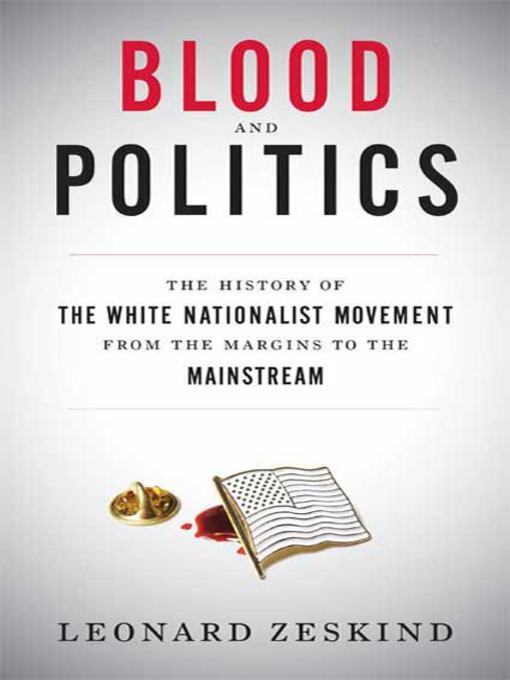
Blood and Politics
The History of the White Nationalist Movement from the Margins to the Mainstream
کتاب های مرتبط
- اطلاعات
- نقد و بررسی
- دیدگاه کاربران
نقد و بررسی

February 2, 2009
Journalist Zeskind delivers a thorough, if scattered, dossier on white nationalist politics in America from the end of WWII to the present, focusing closely on three plotters on the fringe of the American mainstream: Willis Carto, William Pierce and David Duke. Among the book's dizzying investigations of neo-Confederates, skinheads, survivalists, tax protestors, Second Amendment nuts and anti-Semites, these three men loom largest as the provocateurs and grandfathers of racist politics. Drawing on writings from Oswald Spengler and Francis Parker Yockey, these white nationalists constructed a narrative about the death of Western civilization, where white nationalists are patriotic race warriors hawking their ideas at gun shows, in print and in online forums. With the breadth of an encyclopedia, this book features a staggering number of actors, publications, flashpoints and organizations, such as the Posse Comitatus movement, which denies all of the Constitution's amendments after the 14th, prints community money and seeks independence from ZOG (the Zionist Occupation Government). Zeskind's rigorously researched and eloquent book is a definitive history of white nationalism and contains alarming warnings for a resurgence in racist politics.

March 15, 2009
A densely detailed account of the racist right in the last half of the 20th century.
Civil-rights activist Zeskind writes that he first encountered the white supremacist/nationalist movement in the South a quarter-century ago and immediately regarded it not as the lunatic fringe but merely the farther edges of the rising conservative movement."I believed that racists could turn the wheels of history as well as antiracists could," he writes matter-of-factly. Certainly some of the successes of the 1980s—when David Duke (who"rarely missed an opportunity to line his own pockets"), Bo Gritz (who imagined that Zionists ruled the world, with George H.W. Bush as their king), the Christian Identity movement and assorted other haters came to prominence—suggest that Zeskind's concern was well-founded. However, many of the hard-core members of the right had a habit of splintering into factions whenever an alliance threatened to form, so that the ultrarightist contingent could never quite get it together. For instance, Willis Carto, a pioneer of the modern supremacist movement at the center of Zeskind's narrative, could not abide Pat Robertson, though he might have been a natural partner on paper, since Robertson was pro-Israel. Certainly Carto's reluctant endorsement when Robertson ran for president in 1988 was nothing Robertson welcomed—of Carto's tabloid The Spotlight, he said,"one of the most rabid, vicious publications and unfortunately a number of well-meaning Christians think that it is the truth and buy it." The heavily armed Bible-thumpers and aging skinheads who made up the racist right's constituency overthrew Carto, but they never found a spokesperson to take his place—though in his Homeric catalog the author identifies plenty of other activists on the supremacist scene.
Zeskind offers a well-placed warning that the racist right still has plenty of causes left, many wrapped up in the long-simmering nativist, anti-immigration movement. Stay tuned.
(COPYRIGHT (2009) KIRKUS REVIEWS/NIELSEN BUSINESS MEDIA, INC. ALL RIGHTS RESERVED.)

March 1, 2009
These two books provide different perspectives on white supremacy in American society. Journalist Zeskind documents the evolution of Far Right political and social movements since the 1950s. He focuses on the work of Willis Carto, founder of the now-defunct Liberty Lobby, the late 20th-century's leading anti-Semitic (and Holocaust denial) organization, and William Pierce, leader of the National Alliance, a neo-Nazi group supporting white nationalism and white separatism. Zeskind recounts the involvement of these two men with other racialist groups and with individuals such as David Duke, Pat Buchanan, and the fringes of the Republican Party. The most striking fact emerging from Zeskind's book is that these people spent most of the time quarreling among themselves, with Carto involved in frequent lawsuits over control of the Liberty Lobby and its many associated organizations. Pierce died in 2002, and Carto's influence among the Far Right has greatly diminished. However, other individuals continue to spread their ideas.
Ayers (education, Univ. of Illinois, Chicago) and Dohrn (director, Children & Family Law Justice Cntr.), both former leaders of the Weather Underground and longtime civil rights activists, take a different tack on the subject. They present essays that each has authored separately, providing personal experiences and thoughts on race relations in modern American society. Both acknowledge the advancements made in this country during the last part of the 20th century, but they argue that the United States remains dominated by white supremacist ideas that are having an adverse effect throughout the world. The book contains many fascinating ideas drawn from literature, philosophy, history, and the authors' life experiences. Both books are recommended for all libraries.Stephen L. Hupp, West Virginia Univ., Parkersburg
Copyright 2009 Library Journal, LLC Used with permission.

May 15, 2009
Civil rights campaigner Zeskinds massive and sweeping history of white-power movements in the U.S. identifies the constituency of a nominally united band of miscreants bent on halting racial integration and preserving the political and social predominance of whites as the U.S. majority rapidly becomes nonwhite. In dense and careful prose, he tries to illuminate important interrelationships between such familiar folks and phenomena as Pat Buchanan, David Duke, the militia movement, and the KKK. In the postcold war white-nationalist movement, former salesman Willis Carto, a publisher of Holocaust-denial literature, and, to a lesser extent, William Pierce, founder of the white-separatist National Alliance, are somewhat chameleonic characters, who portentously reappear in Zeskinds pages. Carto helped found the Populist Party that nominated David Duke and Bo Gritz for president during its brief existence, while as Andrew Macdonald, Pierce, an erstwhile associate of American Nazi Party founder George Lincoln Rockwell, wrote the incendiary Turner Diaries (1978), an inspiration to Timothy McVeigh. Are their likes steering the U.S. toward extended racial strife? Zeskind seems to think so.(Reprinted with permission of Booklist, copyright 2009, American Library Association.)

























دیدگاه کاربران